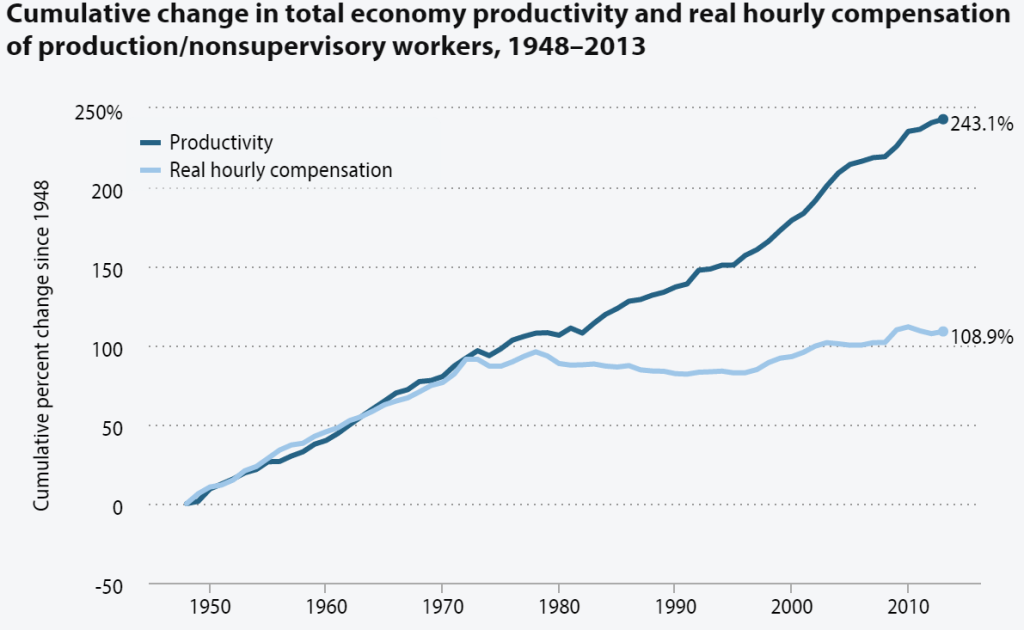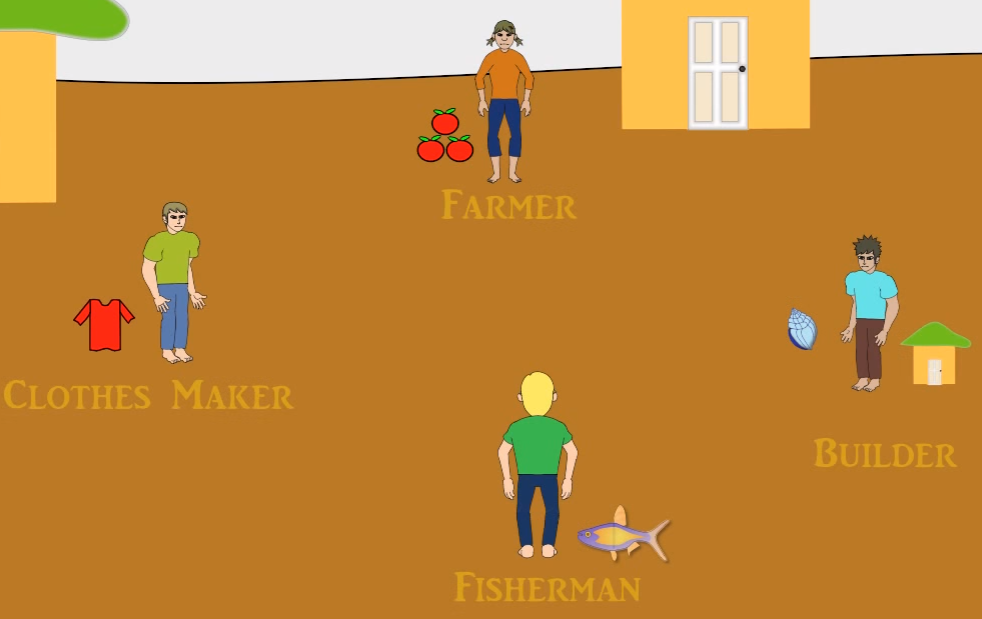
It’s logically impossible for machines to “take a job” out of an economy. Now or ever.
Caveats: 1. I am writing here about the dynamics of economies, not short-term problems or growing pains. When large industries vanish quickly due to obsolescence or changing norms (like smoking cessation in the 20th century US), this can cause serious problems. Intervention and amelioration is called for and important in these cases. 2. I will argue UBI is not relevant to the state of automation. This is not an argument against UBI in general; I am merely arguing that technological advancement by itself offers no support for it. Wealth inequality in general is a separate issue.
As I have previously written, there is much hand-wringing over the prospect of “technological unemployment”. The neo-Luddite fear that machines will take your job. For example:
Giving people free money could be the only solution when robots finally take our jobs | Business Insider
Are robots going to steal your job? Probably | The Guardian
What to do when machines take our jobs? Give everyone free money for doing nothing | The Conversation
How Technology Is Destroying Jobs | MIT Technology Review
This is really a pair of often muddled-together claims that 1) advanced automation/AI/robots cause severe wealth inequality and 2) most or all jobs will disappear permanently such that people are precluded from being employed regardless of their education, skills, or motivation, resulting in poverty.
In this post I will explain the basic logical problems with these ideas, and then turn to address arguments that support them.
What is an economy?
This two minute YouTube video is a good in-a-nutshell explanation of what an economy is and what money is in the simplest terms.
Most basically, an economy is people trading with each other, things that each wants to have but does not have. Trade here is an obligate social verb like discuss or parody. It occurs exclusively between two or more people. Humans, and only humans, are agents that can comprise an economic system. Machines or animals may have costs, but they are not legal or social entities that can be compensated.
Machines can’t remove jobs from an economy because they are not economic agents. Non-agents do not engage in trade, including the type of trade called employment. But wait, I can hear you object, what about when assembly line robots displace thousands of factory workers? It’s true, individual occupations come and go. This has always been true, in any era. Not many milkmen, switchboard operators, or midnight house-to-house feces collectors working anymore are there? But this is different from the total volume of employment or jobs being lost. In fact, the robots on that assembly line only make economic sense for their owners if, and only if, the economy does not lose jobs. Let’s look at the simple island example from the video there to see why this is true.
Let’s say each person produces 4 units a day of whatever they make, one for themselves and each of the others. Each person gives and gets 3 units. In terms of money, the net change is 0 for each per day, but each gets all the things they need, so the economy works and everyone is better off than if they did not trade.
The fear
Now, let’s imagine the Farmer makes a machine that makes clothes, enough for her, the fisherman and the builder. The Clothes Maker is out of a job (for this example, let’s imagine no other possible jobs exist). He is in trouble. Revisiting the two claims above, is it the case that the Farmer/bot owner becomes rich while the others become poorer? The Farmer is now selling 4 units a day (two units of produce, two units of clothes), but buying only two. So the Farmer is making +2 shells a day versus 0/day before the bot. The Fisherman and Builder are buying 3 units and selling only two because the Clothes Maker has no job or shells. This means they make -1 shell a day. This is, of course, impossible. They can’t spend money they don’t have.
In fact, the Farmer will have to lower prices on their produce and clothes units because her trade partners are literally unable to pay as much. The price of clothes and produce must fall, or, prices of their goods must increase. How much does the Farmer have to reduces prices? Until they’re right back to net 0 profit per day. There simply is no more wealth in the toy economy for any other outcome.
In this scenario the Clothes Maker must leave or die, but wealth equality hasn’t changed at all. The Farmer has no more wealth than anyone else. The bot hasn’t changed any of that. UBI is irrelevant to wealth equality here because wealth inequality hasn’t changed.
Could UBI save the Clothes Maker, though?
It doesn’t need to. When the bot showed up prices fell, but also each person had extra inventory they couldn’t even get rid of. The Fisherman was producing 3 excess units a day, but could only trade 2 of them. UBI could be seen as giving that excess to the Clothes Maker, but this is exceedingly silly. In reality, what happens is the Clothes Maker finds something new to do, and the new lower costs of goods make it easier to do new things. Maybe the Clothes Maker becomes the Furniture Maker. In this case, everyone is better off because they can each get something new they didn’t have before. The economy has grown and everyone lives better.
So, we can see the bot allowed the economy to grow and everyone wound up better off than before. There was no change in wealth inequality. And UBI could not have helped.
But what if the total number of possible jobs becomes less than the number of working people?
This is not possible. It isn’t even a coherent idea. Jobs aren’t a feature of the landscape like trees, or of a society, like towns and families. Jobs are part of a relationship dynamic. An economy, including jobs, exists because each person needs or wants something from other people that they can’t produce or obtain themselves by other means. Thus, each works so that they can obtain those things. If one’s needs from other humans decline (because machines make things available to them sans human), then one’s need to work also declines, because they need not pay for things a machine provides.
This is not conjecture, it is what has happened and will continue to happen. Jobs did not vanish in the last few centuries, but they got smaller, even while their relative pay stayed the same or improved. In 1830, the average work week was about 70 hours and over 6 days a week. In the US, the 40-hour, 5-day workweek became standard in the mid 20th century. The current US average is 34.4 hours. Employees also commonly enjoy paid sick days, vacation days, and more Federal holidays off. In some nations in Europe, the work week is even shorter. France has a 35 hour work week, by law. Most of the European Union has 4-6 paid weeks of vacation a year. Compared to the 19th century, this is completely astonishing: 7-11% of the year off, paid.
This is partly due to reductions in wealth inequality, but it’s also a function of the reduction in the needs of each person as a result of machine labor. Pay did not decline. Jobs did not vanish. They just got easier and shorter. As automation increases, this effect will continue. Mandatory work hours will decline, benefits will improve. While I doubt it is ever possible, if machines took “all jobs” there’d be no reason to work, ever, by definition. Currency as we now know it, would simply not exist. There would be almost nothing to buy. At no point in this hypothetical progression is UBI necessary, and ultimately it would be meaningless.
There is no evidence automation could cause unemployment
Since the industrial revolution, various forms of automation, machines, and software have eliminated a large number of jobs humans used to do. Automation has made much of what we take to be modernity possible. Not only is there no steady drop in employment, but right now, as automation is at the highest ever, the US is at or near full employment. Predictions of automation-induced mass unemployment have been around for decades, and yet said unemployment always seems to be “coming soon” and never here.
But isn’t “real” employment down?
Fewer people are working than in past decades, but it’s important to understand why. Is it because they simply can’t find work anywhere? Nope. Many choose not to take jobs they believe they could get. Economics Professor Michael Jones wrote recently in the Washington Post,
According to a New York Times/CBS News/Kaiser Family Foundation poll of Americans without jobs, 44 percent of men surveyed said that there were jobs in their area they think they could obtain but that they weren’t willing to take them. In addition, about a third of those surveyed (including women) indicated that a spouse, food stamps or disability benefits provided another source of income.
An unwillingness to relocate geographically also may help explain the decline in labor force participation. In a 2014 survey of unemployed people, 60 percent said that they were “not at all willing” to move to another state.
He added that the US currently has the most job openings on record since tracking of this metric began in 2002.
Aren’t workers just getting paid less?
Has employment became a farce, with pay not matching rises in productivity? What about this graph?
On this, Jones wrote,
Benjamin Bridgman, an economist at the Bureau of Economic Analysis, has demonstrated that once depreciation and production taxes are taken into account, the story for U.S. workers doesn’t seem as pessimistic. Although the most recent data show that the net labor share in the United States has fallen over time, as recently as 2008, the share was the same as it was in 1975.
Another factor is the rising costs of capital.
Because of the rapid pace of technological improvements, capital depreciates at a faster rate. Companies, or owners of capital, must therefore spend a larger share of profits to repair technology or replace obsolete technology. As a result, labor’s declining share of output is directly correlated to the increasing share of output spent on technology.
I believe this is an illustration of the point I made above. As our need for obligate-human produced things declines, our need to work declines. In this case, we can see that productivity is increasing for non-human reasons, and therefore pay (which should only be responsive to the human reasons), stays the same. Prices, meanwhile, fall, leaving everyone much better off.
We have real economic problems, such as the fraud that caused the recent recession, and growing wealth inequality. Technology can magnify our problems, the same way that plane accidents can be more devastating than horse accidents. But it does not cause them. It is not machines you must be wary of. It is the selfish and cold-hearted humans. This isn’t the newest problem, it is the oldest.

